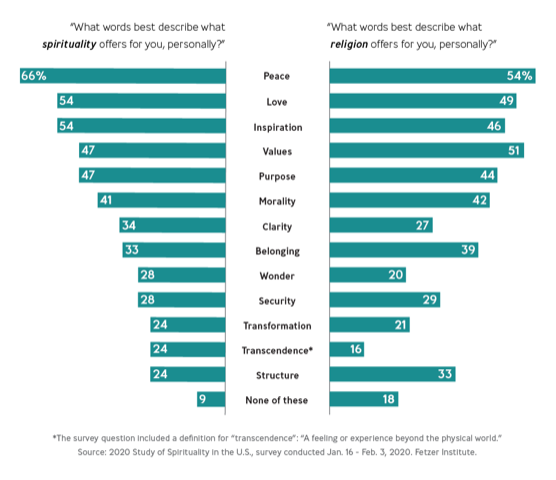Americans who identify as 'spiritual' more likely to engage in politics
A new study intended to suss out the nuances of what Americans mean when they say they are spiritual finds that many people link their spiritual lives to voting and involvement in social movements and politics.
But it also found that only 40% of those who say they are spiritual feel their spirituality compels them to hold politicians accountable.
The study, conducted by The Fetzer Institute, a Michigan-based foundation that promotes spirituality, found a vast majority of Americans — more than 80% — consider themselves spiritual to some degree, and that the more spiritual a person says they are, the more likely they are to engage in politics.
“Democracy is challenged, as we well know, here in the U.S.,” Gillian Gonda, Fetzer’s director of movement building, said in releasing the study today (Sept. 22), just six weeks before the 2020 presidential election. “And understanding how people connect their inner spiritual lives to their civic actions we think is in service to our larger interest in supporting democracy so we can all flourish.”
In its attempt to pin down what Americans mean when they say they are spiritual or religious or some combination of both, the study shows vast overlap between the two. But there is bad news for organized religion among the findings, including an ongoing decline in traditional religious identity and participation.
Chief among the study’s findings are:
• More than 80% of Americans say they are spiritual in some way.
• Three-fourths say they believe in a higher power and more than half of those said they have “no doubts” about that belief.
• About seven in 10% said they feel spiritually connected to the environment — but only six in 10 said they feel the same way about humanity.
• About 70% of those who identify as both spiritual and religious say they are answerable to a higher power for their interactions with the environment and humanity.
• And a vast majority — 88% — said they engage in at least one spiritual practice per week. The most common is prayer (60%), followed by reading and engaging with art (50% each). Other practices include being in nature (41%), performing acts of service (28% ), honoring or communicating with ancestors (14%) and fasting (5%). Only 32% said they attend regular religious services as a spiritual practice.
The study also sheds light on what Americans consider spirituality to mean. Asked to draw what spirituality means to them, respondents came up with everything from traditional depictions of Jesus to natural landscapes to abstract blobs and colorful doodles.
The study was conducted before the pandemic, among 3,609 adults and included focus groups, one-on-one interviews and online and phone surveys.
C. Vanessa White, associate professor of spirituality and ministry at the Catholic Theological Union in Chicago, said the study confirms the importance of spirituality to the American experience.
“It appears to support the participation in our nation’s history that spirituality has fueled and transformed,” she said, including “many of the social movements from women’s suffrage to civil rights.”
And because the study details what kinds of spiritual practices people find meaningful, she said religious leaders should take note.
“They may find insight into ways we can create a sense of community and of belonging” during the current pandemic, she said, which has forced most religious service to migrate online.
The study also shows religion and spirituality are inextricably linked in the minds of many Americans — 60 percent said religion and spirituality are more the same than they are different.
“We found very quickly in our focus groups and conversations with people that even though we were not the first to bring it up, that it is nearly impossible to have a conversation about spirituality without also talking about religion,” said Veronica Selzler, director of Hattaway Communications and chief author of the study.
But there are places where spirituality, more than religion, seems to be more fulfilling. When asked both what spirituality and religion offers them personally, spirituality trumped religion on the top three answers — peace, love and inspiration — and bested religion on five more, including clarity, wonder and transformation.
Religion takes more hits from the study, which found that 22 percent of participants who grew up Catholic or Protestant say they no longer identify with those faiths. Protestants are the biggest losers, down 12 percent, and Catholicism was right behind at ten percent. And half of all respondents who now said they are spiritual but not religious or neither spiritual nor religious reported abandoning their childhood faith.
The study largely echoes previous surveys that show a decline in traditional religious affiliation and a rise in the use of the word “spiritual” to self-identify. In 2017, The Pew Research Center found that about three-quarters of Americans identify as at least somewhat spiritual, and The Public Religion Research Institute found that those who describe themselves as at least somewhat spiritual were more likely to help others.
But there also seems to be a limit to the influence spirituality has on American political activity. While the study shows the more a person identifies as spiritual, the more likely to engage in a long list of community-focused activities — volunteering, donating, protesting, voting and more — only four out of ten linked their spirituality to holding politicians accountable.
White, of Chicago’s Catholic Theological Union, said such findings may reflect Americans’ long history with the separation of church and state.
“We have a very complicated relationship with politics and politicians overall,” she said.
Kimberly Winston is a freelance religion reporter whose work has appeared in The Washington Post, The Los Angeles Times, USA Today and more. She is the recipient of the Religion News Association’s 2018 award for best religion reporting at large news outlets.



